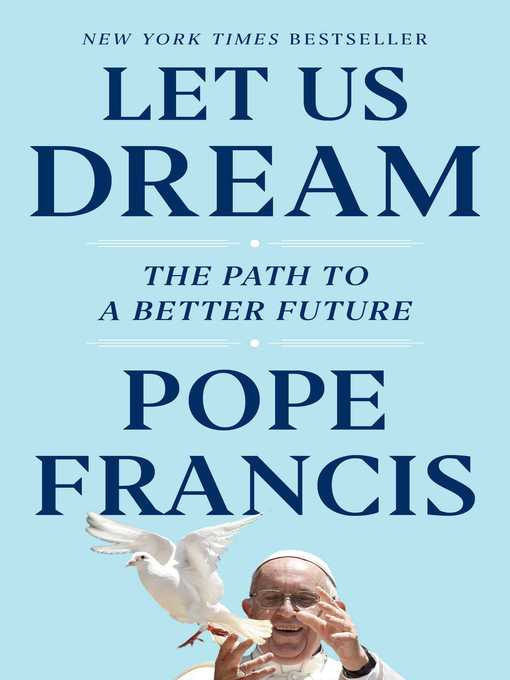
Let Us Dream
The Path to a Better Future
کتاب های مرتبط
- اطلاعات
- نقد و بررسی
- دیدگاه کاربران
نقد و بررسی

Starred review from November 23, 2020
Francis (The Name of God is Mercy) offers pastoral encouragement in this clarion call to create a more just and sustainable world. “We cannot return to the false securities of the political and economic systems we had before the crisis,” Francis writes. Using a three-part framework (to see, to choose, to act), the pope first names behaviors making humanity and the planet sick: “the destruction of the environment with our self-forgetting, our rejection of who we are as creatures of a loving Creator.” He then expounds on values the faithful should use to guide their choices, including consideration of the impact on the poor of any action. Francis takes aim at demagogic populism as well as unfettered economic markets, and defends his 2015 Synod on the Family about pastoral guidelines on traditional roles of and within families, and answers criticisms from conservative Catholics who believe he is too liberal and from progressives who think he is too traditional: “The danger of becoming trapped in conflict is that we lose perspective. Our horizons shrink and we close off paths the Spirit is showing us.” Any Catholic will want to check out this powerful, easily digestible work.

December 1, 2020
Papal reflections on the global pandemic and other pressing matters. In his latest book, Pope Francis provides a brief, earnest discussion regarding the Covid-19 virus' effects on the world and how humanity--and people of faith especially--can respond. One cannot approach this work, which was written in conjunction with the pope's biographer, Ivereigh, without being reminded of John Paul II's groundbreaking Crossing the Threshold of Hope (1994), which was also co-authored by a journalist. The book is divided into three parts (plus an epilogue), calling on readers to observe the problem, discern the way forward, and then take action. "The see-judge-act method has been used often by the Latin American Church to respond to change," writes Ivereigh in the postscript. "Francis had reformulated it in different terms ('contemplate-discern-propose') but it was essentially the same approach." Francis sees in the Covid-19 crisis a danger of narcissism for those who refuse to see it as a global catastrophe or who put self above neighbor in their actions and priorities regarding the pandemic. Somewhat awkwardly, he also explains the thoughtful blessings that such a societal "stoppage" can provide for people, and he hearkens back to the stories of Paul and David, and even his own life, for inspiration. In the section on discernment, the author calls upon Christians to identify and choose the voice of God during these uncertain times: "When we find where God's mercy is waiting to overflow, we can open the gates, and work with all people of goodwill to bring about the necessary changes." Regarding action, Francis emphasizes the importance of community and restoring the dignity of "the people." We must actively seek out healing. "This is the time," he asserts, "to restore an ethics of fraternity and solidarity, regenerating the bonds of trust and belonging. Only the face of another is capable of awakening the best of ourselves. In serving the people, we save ourselves." Forward-looking, heartfelt spiritual guidance.
COPYRIGHT(2020) Kirkus Reviews, ALL RIGHTS RESERVED.

January 1, 2021
With the help of his biographer, Austin Ivereigh, Pope Francis considers the challenges currently facing the world and how those challenges can be met spiritually and ethically in this aptly titled work. His Holiness discusses COVID-19, not just in terms of the dangers it represents, but also the opportunity the disease gives us to step out of our daily lives and contemplate change. He discusses his personal "covids," when crises caused him to throw off old ways of thinking and to evolve spiritually. Written in three parts, the book sets forth the process of recognizing a problem, choosing (with spiritual discernment) how to approach that problem, and then taking action rooted in the awareness of the dignity of each individual. The environments and economies that oppress the poor merit much attention. However, the Pope does not unhesitatingly embrace all areas of social change; interestingly, while he praises the work of women in the church, including in leadership roles, he argues against the ordination of women. VERDICT Informed by spiritual sources and the thinking of some of the world's foremost scientists, economists, and activists, Pope Francis offers tools for creating a better, more just world.--Gail Eubanks, Univ. of Missouri, Springfield
Copyright 2021 Library Journal, LLC Used with permission.

























دیدگاه کاربران